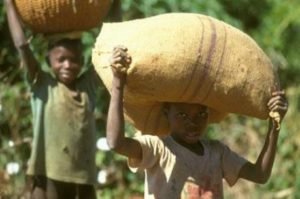Child labour continues to thrive in Ghana – Report
 Child labour continues to thrive across all 10 regions of the country despite the intense public awareness campaign and interventions by the government and non-governmental organizations to provide protection for children.
Child labour continues to thrive across all 10 regions of the country despite the intense public awareness campaign and interventions by the government and non-governmental organizations to provide protection for children.
Many of them, reportedly are daily exposed to hazards, hunger, exhaustion, neglect, verbal and physical abuse by caregivers and employers.
This is contained in a child protection baseline report published by the Gender, Children and Social Protection Ministry, a copy of which was made available to the Ghana News Agency (GNA), in Kumasi.
It cited Brong-Ahafo and the Eastern Regions, where children wake up at dawn to start work and as a result arrive at school exhausted and sometimes late.
There is also child migration for labour, with children in the three Northern Regions identified as the most vulnerable to migration during the dry season (July to September), when “families are unable to adequately feed their children”.
The report said “children sent to live with members of their extended families are often exploited by being forced into economic activity”.
Many of them have been suffering in different ways – excessive work, lack of food and clothing, being subjected to corporal punishment and in some cases sexual abuse.
It recounted the painful and heartbreaking experience of a girl, who was routinely sexually abused by the uncle in the Western Region, quoting her as saying, “my uncle used to come to sleep with me every evening, when his wife was not around”.
“I kept everything to myself till one day, when I couldn’t take it anymore. He came to my room to have sex with me as usual because he thought the wife was not at home.
This time, I gathered courage and started screaming on top of my voice, with all my strength and my auntie came and saw everything for herself. My uncle could not say anything, he was only standing there ashamed.”
“The next day, my auntie brought me back to my mother. We never spoke about that issue because it brings back painful memories.”
Source: GNA
